#The problem is that most people are just human. They are flawed and they are capable of good and bad things.
Text
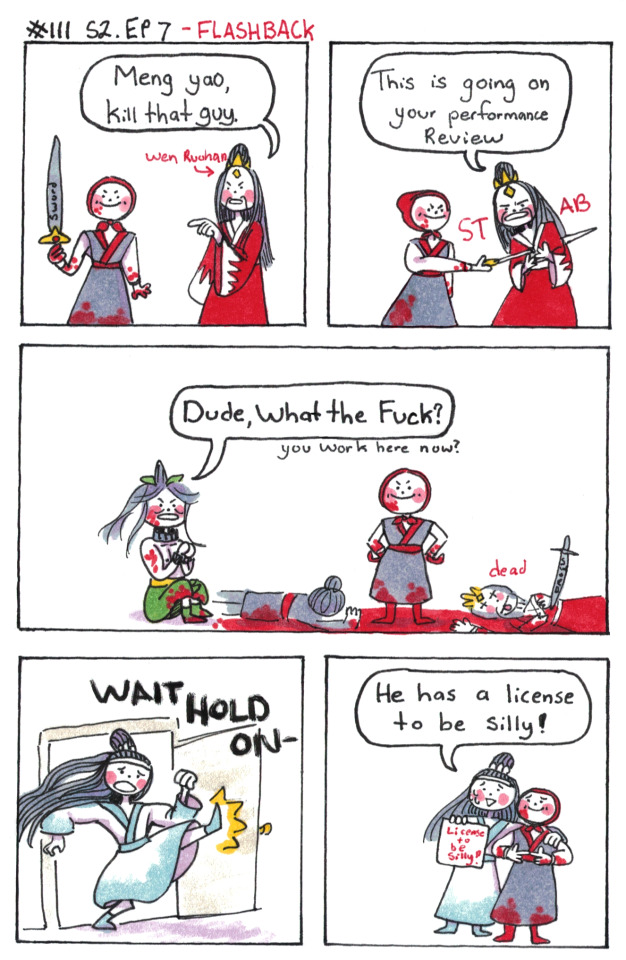
He was just being a silly little guy!
[First] Prev <–-> Next
#poorly drawn mdzs#mdzs#jin guangyao#wen ruohan#nie mingjue#lan xichen#JGY's character is the zigging and zagging guy of all time#We love a little meow meow that can bite and scratch and kill you.#We also love a little meow meow that can mewl pathetically!#'He's evil now and torturing his former friend?" ZAG TIME: He's a spy and feels soooo awful about it!!#ZIG TIME: He (probably) didn't need to go that deep into the role and kill as many people as he did.#Something I really love about the sworn brother trio is how they reflect how our feelings distort our perception of others.#Lan Xichen represents how when we love/care about someone -anything they do can be endearing. They aren't manipulative: they are clever.#Its less about rose tinted glasses and more about reframing every look you get of them. The constant justifications you make for them.#They just need a space to be loved! “They care for me so I will stand by them no matter what to show them I'm there for them!”#While NMJ represents how when you dislike someone - Everything they do is an affront or proof of their foul character.#Everything is a sign. Everything is 'proof' they are just as awful as you want them to be. Every 'good trait' is twisted.#The problem is that most people are just human. They are flawed and they are capable of good and bad things.#Meng Yao's motivations are very complex. Yet he's extremely human all the same. He isn't the saint nor the monster of the story.
1K notes
·
View notes
Text
Being obsessed with moral purity (and the appearance thereof) is far more likely to turn you into an abuser than a kind and compassionate person who cares for their community and there are so many cautionary tales about this in media and yet *gestures at all of social media*
#every single one of us has said and done things that would make us the main character of twitter for a few days. without exception.#like one if the most well known quotes from the fuckin bible is about this exactly. it is so basic.#it's literally just redirection of people's fear and shame around their own actions/feeling/thoughts etc#i think we need to stop putting so much emphasis on being a Good Person#like do your best obviously. treat people with all the kindness you know how. but we are deeply flawed and imperfect beings.#and that's not something that will ever go away#no matter how much you effort you put into self-improvement. you still have to try but you must also#accept the fact that you will often fail#and in the Court of the Internet there is no space for that and therefore no space for real learning or growth#im fairly certain the only cure for this shit is engaging in good faith with other human beings in meat space.#im not SURE because *gestures at all of human history* obviously these problems exist there too#but god knows nothing about how we engage with The Discourse on social media is going to engender real understanding#and lead us to a more enlightened age
6 notes
·
View notes
Text
people acted like ryan gosling’s ken getting more attention than barbie was bc everyone was so terribly manbrained and mancentric even about the woman movie as if the actual problem wasn’t that the ‘she’s everything. he’s just ken’ idea literally guaranteed ken would be more of a character. barbie is beautiful and kind and smart she becomes human and ‘flawed’ but in the context of the film that means she is insecure about her mind and body, both of which are perfect. she has no actual character flaws. ken is far more significantly flawed in his character traits has a more clearly defined arc and got most of the jokes and the only solo character song in the movie. its that one tweet that’s like how could my writing be misogynistic all my female characters are beautiful intelligent perfect angels its that fandom idea of all the women as saints exasperated by their idiot loser men the problem is in the writing
3K notes
·
View notes
Text
Look I know Rapunzel paints and Tiana cooks, but if you guys don't think Mulan is the Most Creative Disney Princess, you're wrong.
She's literally introduced in this perfect scene that highlights her whole character, flaws and strengths:

The first time you see her she's:
Cheating, which is totally the opposite of what honor-code General Shang would do.
Undisciplined, which is what going to the army fixes.
Problem-solving—by writing the recitation she can't remember on her wrist—
BUT LISTEN. That last one is the first hint you have that she's the Most Creative Disney Princess. Because guess what? She's not the first young woman to cheat at the matchmaker test. The Matchmaker specifically checks to see if she's cheating when the test begins. But the rest of them wrote their cheat sheet on their fans.
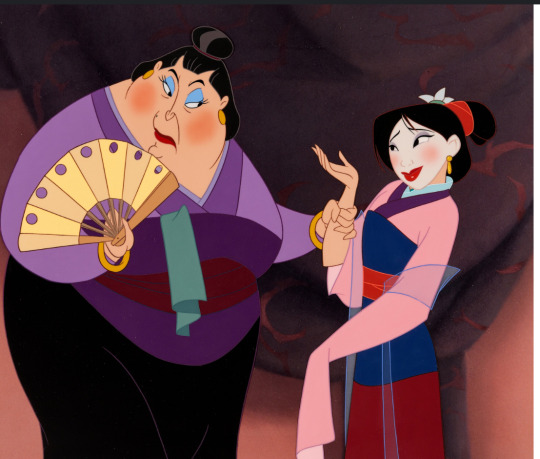
The Matchmaker was prepared for the usual kind of tricks. But Mulan's full of her own ideas, not everyone else's.
You guys know the rest. She dresses up like a soldier—nobody suspects her because the idea that someone would do that never occurs to everyone else. She climbs the pole by tying the medallions around each other when none of the other recruits can figure it out. She lights the cannon by grabbing Mushu instead of searching for flints. She creates an avalanche instead of just taking Shan Yu out. She tricks the Huns by dressing her friends up as concubines. She defeats Shan Yu with his own sword and a bunch of fireworks.
But even beyond problem-solving, Mulan never does things like other people do. She doesn't even do things like other women do.

She doesn't just walk across a bridge, she jumps from pillar to pillar. She doesn't just bring her father tea, she puts a spare teacup in her sleeve because she knows she's clumsy.
Mulan is creative. But you know what that moment proves? That she's not just a representation of all women-versus-men. Mulan is representative of a human, who sees where she has strengths, and sees where she has weaknesses. She uses her strengths to her advantage and works to improve or make up for her weaknesses. She doesn't try to be exactly like a man. She just tries to use what she's got to do the right thing. And finding ways to use what you've got, even if it's not like what everyone else has, is creativity.
#Mulan#Mulan meta#hua Mulan#fa Mulan#General Shang#Shang#china#Disney#real Disney#Tom Bancroft#Disney's Mulan#animated Mulan#mulan 1998#meta#character analysis#Rapunzel#Tiana#Disney Princess#Disney princesses
2K notes
·
View notes
Text
The 5 Most Essential Turning Points in a Character’s Arc
You spend so much time creating a character because you want them to feel real. You want to connect with them and use them to create an experience for your readers. Their character arc is how that happens.
Don’t miss out on these essential turning points that make an arc feel not only whole, but complete.
1. The Inciting Incident
Your inciting incident gets your plot moving. It isn’t going to be the first sentence of your story (also called your hook), although it could be if you crafted your first sentence for that purpose.
An inciting incident is a plot event that guides your character in a new direction. It’s the successful prison break, the meeting of instant rivals, or the moment your protagonist wins the lottery in your first chapter.
Without the inciting incident, your protagonist’s life would carry on as usual. They wouldn’t start the arc that makes them an interesting person for the reader to stick with throughout your story.
2. Introducing the Protagonist’s Main Flaw
Every protagonist needs a primary flaw. Ideally, they’ll have more than one. People aren’t perfect and they rarely get close enough to only have one negative characteristic. Protagonists need that same level of humanity for readers to connect with them.
There are many potential flaws you could consider, but the primarily flaw must be the foundation for your character’s arc. It might even be the catalyst for the story’s peak.
Imagine a hero archetype. They’re great and well-intended, but they have a problem with boasting. Their arc features scenes where they learn to overcome their need to brag about themselves, but they get drunk and boast in a bar right before the story’s peak. The antagonist’s best friend hears this because they’re at the same bar, so they report the hero’s comment to the main villain. It thwarts the hero’s efforts and makes the climax more dramatic.
Other potential flaws to consider:
Arrogance
Pride
Fear
Anxiety
Carelessness
Dishonesty
Immaturity
3. Their First Failure
Everyone will fail at a goal eventually. Your protagonist should too. Their first failure could be big or small, but it helps define them. They either choose to continue pursuing that goal, they change their goal, or their worldview shatters.
Readers like watching a protagonist reshape their identity when they lose sight of what they wnat. They also like watching characters double down and pursue something harder. Failure is a necessary catalyst for making this happen during a character’s arc.
4. Their Rock Bottom
Most stories have a protagonist that hits their rock bottom. It could be when their antagonist defeats them or lose what matters most. There are numerous ways to write a rock-bottom moment. Yours will depend on what your character wants and what your story’s theme is.
If you forget to include a rock-bottom moment, the reader might feel like the protagonist never faced any real stakes. They had nothing to lose so their arc feels less realistic.
Rock bottoms don’t always mean earth-shattering consequences either. It might be the moment when your protagonist feels hopeless while taking an exam or recognizes that they just don’t know what to do. Either way, they’ll come to grips with losing something (hope, direction, or otherwise) and the reader will connect with that.
5. What the Protagonist Accepts
Protagonists have to accept the end of their arc. They return home from their hero’s journey to live in a life they accept as better than before. They find peace with their new fate due to their new community they found or skills they aquired.
Your protagonist may also accept a call to action. They return home from their journey only to find out that their antagonist inspired a new villain and the protagonist has to find the strength to overcome a new adversary. This typically leads into a second installment or sequel.
Accepting the end of their arc helps close the story for the reader. A protagonist who decides their arc wasn’t worth it makes the reader disgruntled with the story overall. There has to be a resolution, which means accepting whatever the protagonist’s life ended up as—or the next goal/challenge they’ll chase.
-----
Hopefully these points make character arcs feel more manageable for you. Defining each point might feel like naming your instincts, but it makes character creation and plotting easier.
Want more creative writing tips and tricks? I have plenty of other fun stuff on my website, including posts like Traits Every Protagonist Needs and Tips for Writing Subplots.
#character arcs#creating characters#creating character arcs#character development#writing characters#character concept#plotting#how to plot#writing plot#creative writing#writeblr#writers of tumblr#writing tips#writing advice#writing resources#writing inspiration#writing community#writing help#writing
1K notes
·
View notes
Text
Pretty privilege…. No MC privilege pt.2
Satan
Mc can always expect him to take their side no matter what.
Mc was the first person to see past his angry and treat him like a person.
He is forever imbedded to them.
No matter how criminal the crime.
Mc was the one to start a fight? Well why was the other person fighting back?
Mc broke an expensive vase? If it’s so expensive why it is out, where anyone can reach it?
Mc started a fire in the kitchen? Devildom ingredients can be dangerous for human use-age.
He will most likely find a way to flip Mc problem on the person who accused them.
He his mind you do no wrong.
But not to be mistaken, he knows Mc is reckless but guidance is key! (He thinks)
Asmo
He will put Mc comfort over his.
He’s spent millennials admiring himself and put himself over other by default.
Mc showed him that his soul is more blinding then any gold or highlighter he puts on.
Mc has showed him a new way of viewing life.
Mc looks uncomfortable sitting on the floor during movie night? Just take his seat… matter a fact his kicking his brother off so you can have space.
Mc is tired of wearing their heels? He’ll switch shoes with you.
Mc is carrying a lot of bags that look heavy? He’ll carry them himself no matter how ugly he thinks it is.
He is letting go of his persona of being perfect because Mc taught him your flaws make you unique.
Buttt old habits die hard but Mc just has to look at him and he knows to settle down.
Beel
Mc can use him as a stress reliever( not that way ^_^)
He is the strongest brother( without and magic or demon forms) he works out and knows it can take stress away.
Mc showed him it’s not enough to be strong physically, but mentally.
Mc and beel are two side of the same coin.
He never wants Mc to hold what their really thinking or feeling back.
Mc’s had a really bad day? Are we going to the gym or on a run?
Mc is refaced with a bad memory? Does Mc need to yell he will listen? Or does Mc want to punch someone or something? He is right there.
Mc feels the need to let out some energy? Does Mc want to practice with him and his team?
He knows that sometimes people need to get violent to relive their stress.
Nothing that Mc May do can hurt him. So go crazy >_<
He thinks Mc is the strongest person he will ever meet.
He strive to be just like them.
Belphie
Mc can expect him to make an effort.
He’s had lots of time to dwell on his past mistakes and understand where he went wrong.
He will spend an eternity trying to make things right.
He wants Mc to know he’s trying his hardest for them.
He’s trying to living up to the honor them Mc gives him.
Mc has been feeling stressed? Flowers and a gift basket are at their door with a note that has the letter “B” on it.
Mc has to go to a meeting but also need to do my chores? He’ll make sure they’re done before Mc is back.
Mc and Belphie got Into a fight? He’s still texting them “ Goodnight, I love you “ because he knows how easily you can be taken away.
All his life his been deemed lazy or useless. It never bother him until Mc.
He is becoming the best version of hisself because he wants to be the demon whose worthy of a pact with Mc.
A/n/: should I write this for the dateables?!?!
I should also mention that I love writing so feel free to request!!
A new post about volleyball will be up soon!
Ty all!❤️
Pt.3 is up!!
#obey me belphegor#obey me#obey me headcanons#obey me fluff#obey me shall we date#obey me mc#belphegor obey me#beelzebub obey me#obey me asmodeus#asmodeus obey me#om! satan#om! beelzebub#om! belphie#obey me hcs#obey me satan#obey me beelzebub#obey me belphie#meyobe#asmo obey me#beel obey me#belphie obey me
1K notes
·
View notes
Text
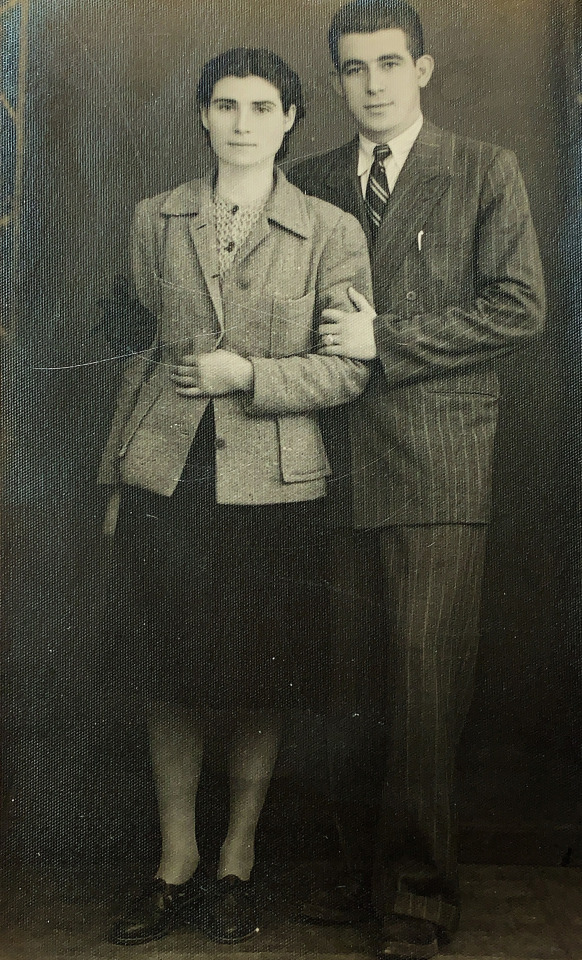
When I got to this photo in Katrina's collection of vintage family imagery, I was pretty stumped as to how to approach it.
There is a major problem when you zoom in to 100%.
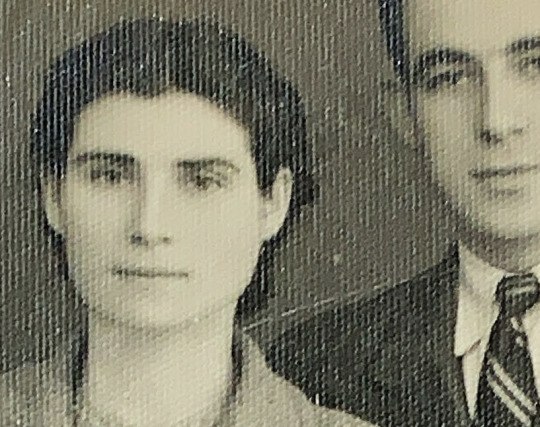
The paper it was developed on has little micro bumps. When it was scanned, the light from the scanner caused a highlight on one side of the bump and a shadow on the other. This causes a pattern which is nearly impossible to eliminate using traditional techniques.
The easiest way to fix this is actually quite clever. You scan it once, then turn it upside down and scan it again. The second pass reverses the side the highlight and shadow appear on, so you can combine the images in Photoshop and blend them together, essentially canceling out the bumps. It's weirdly analogous to noise canceling headphones.
But I don't have access to the physical copy of this image.
So... now what?
Enter Fast Fourier Transform or FFT.
This is a filter that uses extra fancy math to recognize patterns in the image and eliminate them. There is a pretty good filter for Photoshop, but it does not work easily with newer Macs with Apple Silicon. I really did not want to figure that out, and I also was too tired to go downstairs to my PC. However, I learned that a Photoshop competitor, Affinity Photo, has this filter built in. So, I downloaded a trial copy and started the process of trying to figure out how to fix this image.
It was amazingly simple. It brings up these star patterns and you just paint black circles over every one but the center. It literally felt like magic. (Full screen with sound recommended)
So once I did this process I ended up with this...
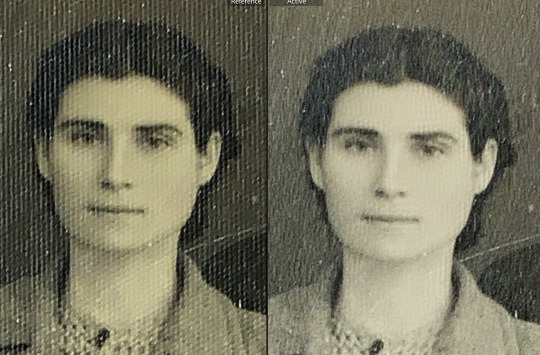
The paper still had a rough texture but it was much easier to work with using traditional techniques. I started with a black and white conversion and meticulously went through the photo zapping scratches and flaws and balancing tones and sharpening facial features. All of my photo restoration tricks were needed.
I eventually landed here...

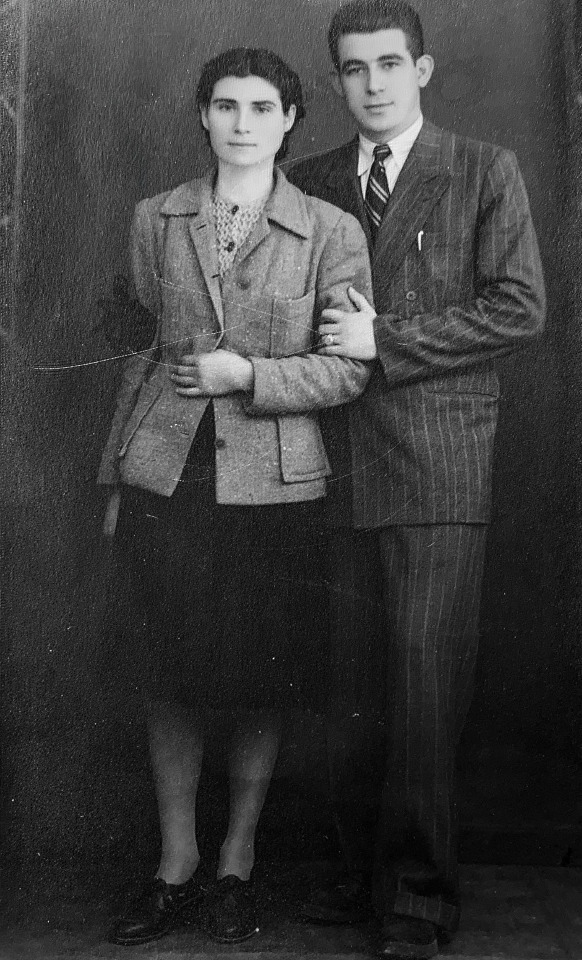
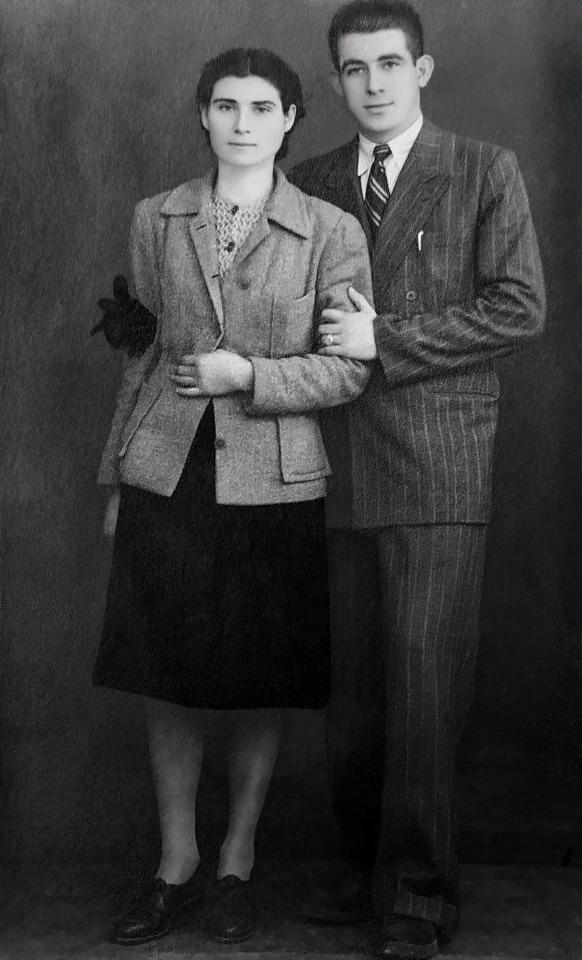
I then thought maybe I should match the sepia tone of the original print, so I got to here...
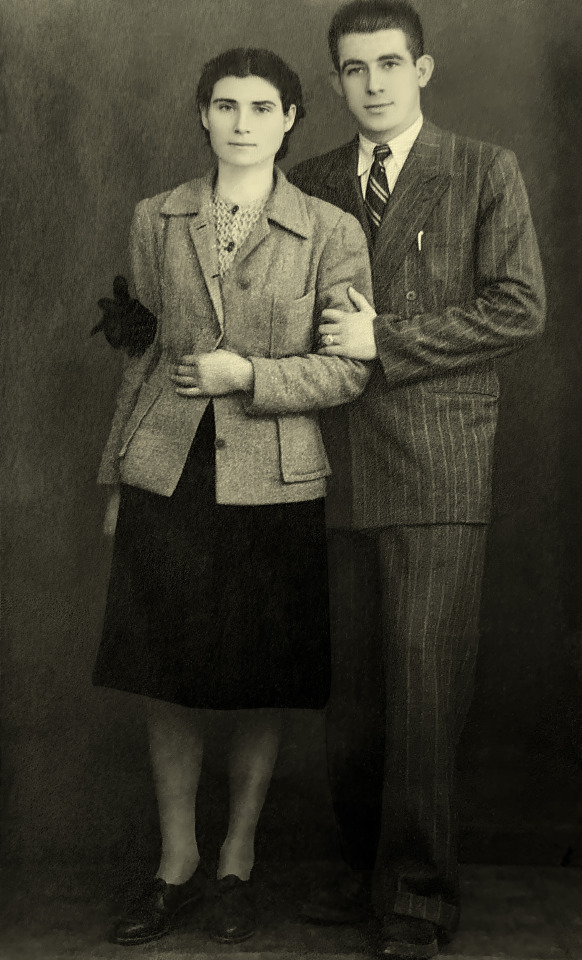
I think the black and white looks nicer in this instance, but I always like having options and this is the most faithful representation of how the photo originally looked.
But there is something else I have been playing around with lately. Photoshop has these experimental neural filters that use cloud processing to do various tricky enhancements. Most of them are in beta and they can be very quirky. But they have a colorizer that tries to detect people and things and adds color to them. Not every black and white photo is a good candidate. I have found these professional portrait photos work decently, but the filter is very hit-and-miss. And there are tools within the filter to help you make a miss more of a hit, but often I have to accept the photo isn't going to work.
But I decided to give it a shot with this one and surprisingly, the colorizer got me most of the way there.
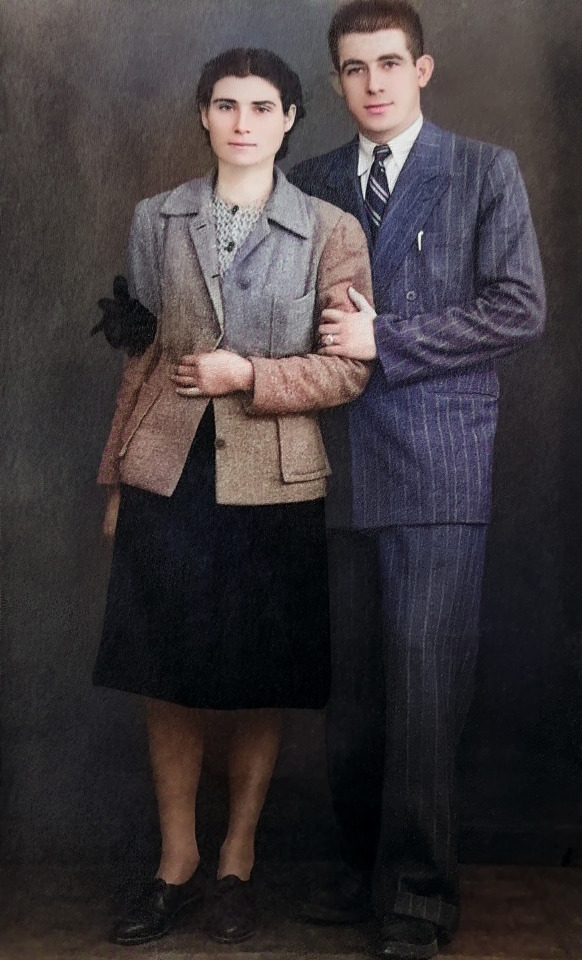
I can work with that.
The one thing it does well is skin. Manually painting color onto skin is tricky and requires more skill and knowledge of traditional painting techniques than I have. But if a filter can do that part for me, I can do the rest.
So after my touchups, I got the image to here.

All I have left to do is my standard color enhancements to make them a little less ghostly and a little more human.
And I present to you where I started and the finished product. I encourage you to flip back and forth.


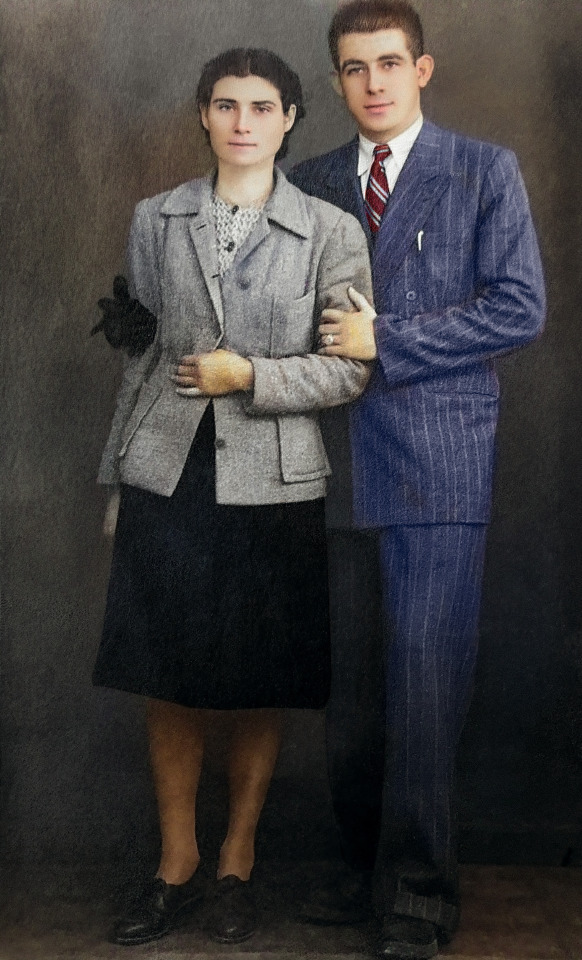
I'm not sure how, but I was able to go from an image I thought was impossible to edit to a beautiful colorized memory for my best friend's mom. I cannot wait to show her.
868 notes
·
View notes
Text
Mizu was wrong to let Akemi be taken because they both deserve better
First, a confession. When I saw this for the first time:
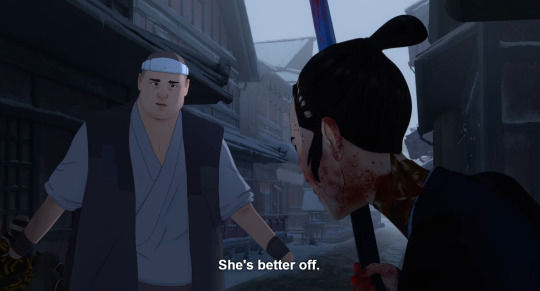
I was relieved. I knew that was what Mizu was going to say and I felt like it's what I would have said in that situation too.
When Akemi does this:
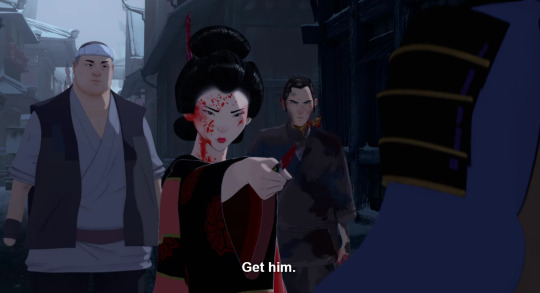
I cringed, because if we know anything about Mizu, it's that she (1) isn't quick to make friends (though to be fair, even though Akemi did try to kill Mizu, so did Taigen - multiple times! - and look how that turned out lol), and (2) doesn't take orders.
So when Akemi and Ringo and later Taigen get angry at Mizu, are they being unfair?
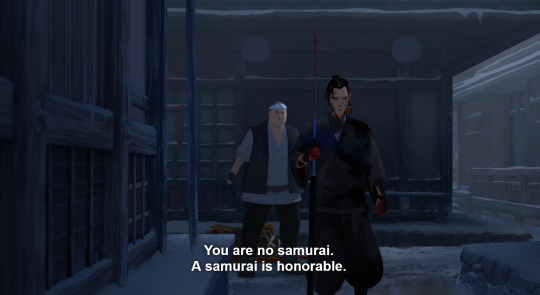
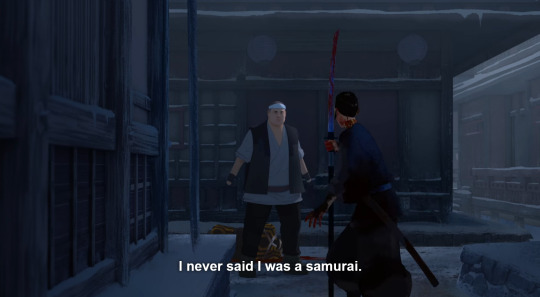

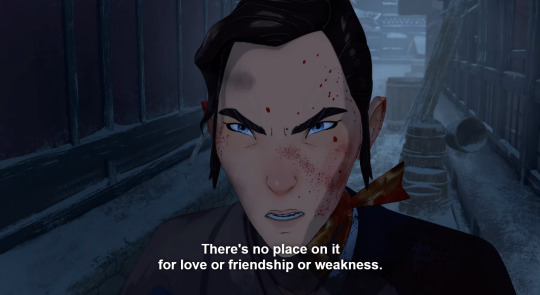
Sure, Mizu isn't obligated to treat Akemi - or Taigen or Ringo or anybody else - nicely, or to serve them, or to be honorable, or be a hero to them, or whatever. No human being is obligated to any other human being. We all have the choice to do whatever we want to anybody else. But the point of flawed characters in storytelling is the tension between those characters and their potential. Their growth into someone who can choose the higher, harder path, who chooses to be obligated to others, who chooses kindness and compassion.
Because Mizu's problem isn't revenge. Nobody is preaching at Mizu that revenge isn't the answer. Her circumstances do suck, her life has been incredibly unfair, she is marginalized, and as far as we and Mizu know for most of the season, she is a child born of violence and no one is saying that that violence doesn't deserve to be repaid in kind.
Mizu's problem is isolation. And the fact that she thinks she has no responsibility toward her fellow human beings, because her hatred of her own circumstances and her having no life outside of her quest devours everything else. This is a problem because it turns Mizu into the worst version of herself. A version that hurts the people who like Mizu, the people who care about her.
Practically, Mizu has just taken on an entire army almost by herself. She's hurt. She's exhausted. If she were to defend Akemi now, it'd be yet ANOTHER fight, this time against horsed and armored samurai.
But that's not the reason Mizu gives Ringo. Mizu's ability or willingness to fight isn't even on her mind. All she says is, "She's better off."
"She's better off" is Mizu deciding what's best for Akemi. Akemi's entire story is about her being a caged bird longing to fly free.

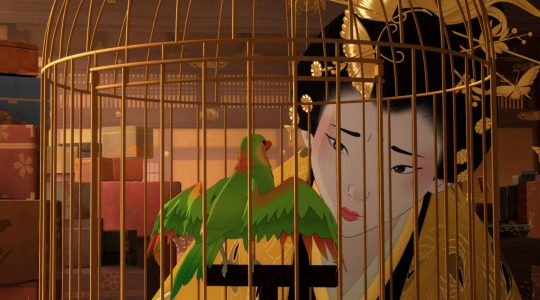
One after the other, every man and woman in Akemi's life makes her decisions for her. She has to grovel and smile prettily and lie through her teeth just for the chance to be heard. Mizu judges Akemi for being a rich princess who isn't being more grateful for what she has, all without understanding Akemi's situation, and without any curiosity for why Akemi feels the way she does. From Akemi's perspective, Mizu is just one more person (one more man!) in a long lineup who ignores Akemi's wishes and (casually!) makes a decision for her that impacts Akemi's life greatly.
In the end, even Seki concludes that Akemi should get to decide what's best for Akemi. What others think that Akemi SHOULD want does not matter compared to what Akemi wants for her own life. As Madame Kaji said - Madame Kaji, who despite calling out the weirdness of Akemi's situation as well as the childishness of her decision to run away - is the only person Akemi meets who doesn't try to make decisions for Akemi, but instead only challenges Akemi to work for and be worthy of what she wants - she needs to decide what she wants for her own fucking self, and then take it.
Mizu being born female does not make her automatically wiser for letting Akemi be taken, and it does not preclude her from having a hand in giving Akemi back to her jailers. A patriarchy that Mizu knows full well would stop Mizu from achieving her own goals if she didn't present as male.
Mizu is still understandable here. She just had to kill Kinuyo, a disabled girl sold by her father into prostitution, a girl in a situation so far beyond Akemi's worst imaginings that I can practically feel Mizu's world being rocked just by comparing them in her mind the way she most likely is. That still doesn't make it right for Mizu to let Akemi be carried off to be sold into marriage by her father against her wishes. Those "good options" Mizu thinks Akemi has don't exist, no more than they ever existed for Mizu. Akemi and Mizu both have to get creative, make the best of their circumstances, take dangerous risks, and break rules in order to have any control over their own lives.
Even on my first watch, when at first I thought that Mizu had made the right decision and that Akemi was being unreasonable, Akemi screaming Mizu's name while being dragged, LITERALLY DRAGGED, back to her father was haunting as hell.
Mizu had the power to help Akemi, and simply chose not to.
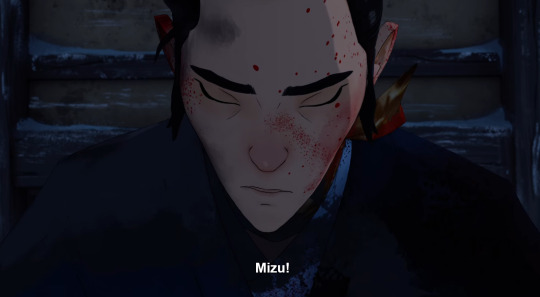
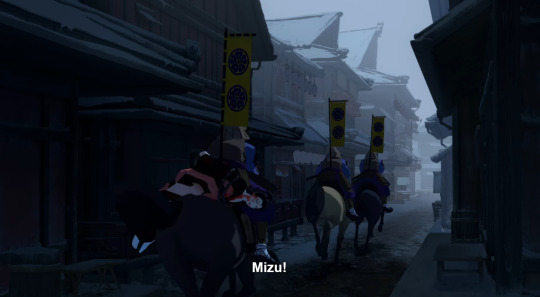
Mizu lets Akemi be taken, Akemi who has just begun to trust Mizu. Mizu calls Ringo weak and quickly - seemingly easily - turns her back on him. Mizu values her quest over Taigen's life, after Taigen has endured days of torture to protect her, and she not only risks his life in the process, but doesn't tell him that Akemi is engaged to someone else, or that she came looking for Taigen, or that she is in danger.
Mizu's sword breaks because it is too brittle. Too pure. Too singleminded. Mizu only melts down the meteorite metal when she mixes the metal with objects from parts of her life that have nothing to do with her quest. Objects from the people she cares about, and who care about her.
All I'm saying is - Mizu doesn't have to be a hero. But she is the better version of herself when she reaches out to help and connect with others. When she's just a decent, kinder human being. And I think that's what this story is telling us that we should want for Mizu.
#blue eye samurai#mizu#akemi#bes#I have so many more thoughts about Mizus tangential relationship to honor and heroism but that is for another post#also reviewing these scenes made me realize that when Mizu calls Ringo weak she LOOKS POINTEDLY AT HIS (LACK OF) HANDS#she legit calls him weak for his disability after EVERYTHING THEY'VE BEEN THROUGH#like Ringo was def disappointed that his master chose not to behave like the (nonexistent) samurai ideal#but what made him ANGRY was the weakness comment and I did not clock that before#also to be explored more in another post#a third thing to explore in another post is how both mizu and taigen have wronged akemi on the basis of Edo period society being A Society#though Mizu starts to correct her own mistake by going back for Akemi - its Taigen whos on thin ice lolol
711 notes
·
View notes
Text
Time to do my "scare the hoes" moment.
Communism is an inherently flawed ideology. It appeals to the sense of fairness all humans have and has this veneer of intellectualism. Like, if you actually read Marx and Lenin it becomes very clear that they were very sheltered people who just didn't understand humanity. It also shares many of the same problems as Fukuyama's "End of History" in that it assumes that history is a linear process of evolution, rather than chaotic and random and influenced by so many factors.
Communism, on paper, FEELS like it should work and would be the most fair way to structure society. But it is and always will be impossible to implement in practice.
Also, IDK about Marx, but Lenin would'be fucking sent you to the death squad for even suggesting a welfare system to him. "Those who do not work, shall not eat."
Like, we can argue the merits of modern EU-style Democratic Socialism all-day long, that system at least SOMEWHAT works (not without it's issues, but it works).
But full-on communism? Nuh-uh, never gonna work. Just pure utopia.
Same with most kinds of anarchism. They actually did work in pre-industrial societies, but with modern production pipelines for every necessity, it's just pure insanity.
285 notes
·
View notes
Text
I've heard a lot of theories about Caine's name, and while I'm not sure if anything's been confirmed by the creators (I don't use a lotta social media and stuffs so I'm not entirely in the loop if they've said things on there), but I have my own little theory. It's not really that complex or anything, but here goes nothing! This is based just on what was seen in the pilot, so I may be wrong about Caine's characterization. After all, we only have a little to go off of, so far!
So, I hear a lot of people mention the Cain and Abel story from the Bible, but I personally don't believe it is connected to that, so far.
I think it might be a reference to novocaine, an anesthetic which is most commonly used during dental procedures to numb an area of the mouth. It's not the most common drug used for dental procedures, since that's now lidocaine (which, well, also ends in CAINE), but it the most commonly known drug and used to be the most common. I mean, for one, Caine's head is literally a set of teeth with gums, and novocaine is injected into the cheeks or gums. The other reasoning I have for this is that while Jax, Pomni, Zooble (is her name is referencing something I just don't know what it is), and Gangle's names don't have much to do with their appearance, Kinger, Ragatha, and Bubble's names do. Kinger's a chess piece, Ragatha is based on a Raggedy Ann doll, and Bubble is... well, a bubble!
Another reason I have for this is a bit more metaphorical. Since Caine is and AI and the ringmaster, as well as the fact that he is clearly trying to keep the humans trapped entertained, he's essentially there to try to numb the fear, dread, and mental pain that being stuck in the Digital Circus causes. By distracting them with adventures, witty dialogue, and even going as far as to try to make a fake exit to keep them hopeful, he's basically doing what he can to just keep them sane so they won't abstract, even if he isn't the best at doing so. He can't get them out, he can't 100% for sure keep them from going insane, but he can provide mind numbing distractions and games to give them something... possibly with the hopes that someone outside the program may, one day, get them out. It's a bit like how novocaine can't *fix* the problem you're going to the dentist for. That's the dentist's job, not the anesthesia's. The novocaine can only numb you up while they do so.
EDIT/ADDITIONS: Another thing is that the reason why most modern dentists don't use novocaine is because, even though it is a minority of patients, some people have severe allergic reactions to novocaine. It is less likely to have a reaction to lidocaine, which is why most modern dentists use that, or other anesthetics, instead. This could relate to how Caine WANTS to help the people trapped, but due to his own obliviousness and habit for mischief, he more often tends to cause distress instead of joy or fun. He has every intention to help them, be it bringing joy or simply distracting them, but there is a flaw that is causing problems with him being successful at it.
#the amazing digital circus#tadc#tadc caine#tadc theory#idk#I just found it interesting#Plus I like the idea#Give me tooth symbolism#I want it now#I probably explained this like absolute dog water#I hope yall understand what I'm trying to say aaaa#My medical special interest kicked in the#second I saw teeth and the name Caine#Then I kept thinking about it#My ADHD thoughts at 1 AM are always like this
467 notes
·
View notes
Text
hi originally posted this at the end of a long thread of back and forth, here’s the og post if you want full context but i feel like this needs to be its own post especially bc i keep seeing this argument being made—the argument that the kids (in this case it was annabeth) SHOULD just know the monsters are monsters and who they are and how to defeat them before ever encountering them, that it’s a problem if they don’t.
the problem is not if 12 year olds should recognize a trap when they see one, even if they’re smart 12 year olds, and if that’s realistic. that is entirely beside the point.
the problem is rick riordan wrote a book series whose formula is bringing myths to the modern age and he’s not sticking true to that in the show—percy jackson and the olympians’ Shtick is taking these classic, ancient threats and giving them a new face. these traps work because these kids are not walking into a cave marked with Get Out and getting ambushed by monsters—the monsters are disguised as harmless mortal human beings, in harmless mortal human being places (for the most part) and i think we—and more importantly, the show—are all forgetting the mist, the magic involved here. it’s not just that medusa is a “creepy lady with her eyes covered” it’s that there is ancient magic at work here, magic that, like the systems of abuse pjo exists to criticize, has been evolving and continuing its malevolence for millennia. it’s formulaic, that’s the point. it’s the same trap you’ve learned about all your childhood, the same trap a thousand children before you learned all their childhoods, and still, it works. you fall into the trap. because that’s how generational abuse works. it’s a trap. it isn’t enough to learn monsters exist, what they look like from a second hand story that originated thousands of years ago. if you want to escape alive, you have to adapt as quickly as they do, recognize their face, and ultimately, beyond any individual trap, the game itself has to change. real, generational change.
so. the problem is rick riordan wrote a series with a formula for action that perfectly captures the overarching, systemic conflicts he was commentating on, and then threw that formula out in the show because it was “unrealistic”. i don’t give a damn about realism when it works to the detriment of the story. this is a story about generational abuse, yes, but it’s told through ‘a tale as old as time’ and that’s why it works so fucking well. and when it comes to basic storytelling, if your characters know the threat before they even walk in and you do practically nothing to then make up for the stakes you have removed, that’s a flaw. now you’ve lost the entertainment value for your audience, on top of also lessening your themes.
something else that is so. honestly soul-crushing as a writer and a creative, is that to me this is reflective of the way we are now afraid to tell earnest stories. stories where we care not for listening to the people who want to pick apart fictional, mythical, fantasy stories for not being “realistic” instead of aligning with our target audience who acknowledges reality is not what makes a story. think of your favorite movie, show, book, comic, what have you—has the reason for your favoritism ever been because it is the most reasonable, the most grounded, the most practical out of any you’ve seen? or is it because of the emotion? the way it speaks to you, to your life and the person you are? the journey it takes you on? is the percy jackson and the olympians book series so good because it’s inherently realistic?
the secret to storytelling is, very simply, focus on your story. everything else is secondary. if it’s written well, it doesn’t matter to me that the characters walk into a trap that, to the audience, is obviously a trap. because i can understand how the characters don’t know it, and how the story falls apart if the narrative just tells the characters it’s a trap from the jump. that’s what dramatic irony is—first used in greek tragedies! this is literally a tale as old as time in every sense except for the end—where it’s happy. and it’s not earned if we don’t first see, over and over, the status quo as a tragic trap.
it’s not about if annabeth (or the other kids) is “smart enough” to not walk into a trap, or about if she’s just too prideful to not walk into what she knows is a trap (or any reason that could apply to the other characters), it’s that annabeth, at the end of the day, is a character. she is a storytelling tool for the messages of the narrative. that doesn’t make her any lesser. in fact ignoring it reduces her, because it reduces what she represents. it’s about how rick riordan, or whoever else at disney, has fumbled the storytelling bag so ridiculously hard that they can’t take the simple, effective formula outlined from start to finish (by good ol 2009 rick himself) and adapt it to the screen without answering the most unimportant, derailing, anti-story questions.
#one of the ppl who reblogged the og post said whatever happened to suspension of disbelief and i could have kissed them on the mouth#yes exactly#this new age of audiences who praise ‘realism’ over good storytelling i hate u#‘content over cinema’ i hate u.#i’m not even a screenwriter but any writer can tell you#we’re talking foundations of the craft here#and the worst part is rick already succeeded in the books#if it ain’t broke don’t fix it#where along this path did he lose sight of everything he set out to say?#anyways this is its own post now go forth and do with it what u will#pjo#percy jackson#pjo show crit#percy jackson and the olympians#pjo tv show#percy jackson tv show#annabeth chase#ris raves
351 notes
·
View notes
Text
“ Why do people hate things being Jedi critical? It’s okay if they’re flawed.”
There’s flawed and then there’s presenting the idea the in universe religious minority who essentially have to fucking do everything as narratively ‘flawed’ bc they don’t appease everybody essentially. Be it Anakin, be it their philosophy, etc and correlate to the idea of how that leads to their fall. Most ‘Jedi critical’ points just assigns a unusual level of onus on them for simply existing. Jedi are human/human-like so we know they’re flawed to a point but when they’re accessory to slavery, accuse them of child taking, or whatever points and ignore context, it’s not being critical. Y’all just wanna slander.
Whats actually annoying is how this fandom & this franchise can look at this religious minority group (composing a lot of PoCs & allusions to other cultures) who get literally persecuted by a politician who created a entire army called Stormtroopers, which is right on the nose for Nazi allegories, and go “lets craft ideas & stories that suggest they’re at fault for really existing & not being perfect paragons of good.” This is the same fandom to say the Sith made some good “points” despite being a part of the problem, ignore the Msndalorian’s weird ass system of government, and find ways to sympathize with characters who participate in murder & genocide because they’re hot (Anakin, Kallus, Maul).
And to top it all off, the story had them killed via mind control to shoot them in the back by people they bonded with for maximum hurt & efficiency after fabricating a war using OTHERS.
177 notes
·
View notes
Text
When your Antagonist is Also your Protagonist
If there’s one thing humans are all really good at, it’s getting in our own way. Most stories have at least some element of protagonist against themselves—we create this block between our protagonist and what they want when we create their flaw.
However, stories that rely on this conflict with self have to do a bit extra work. Internal motivations and antagonists are a bit more challenging, but still a valid way to introduce conflict into a story. Here’s three considerations for when your antagonist is also your protagonist:
1. What is preventing them from what they want?
This is the same question we ask ourselves when creating character flaws, but I think it deserves repeating here. There has to be something you can name that is standing in the way of your character, or this won’t work. It must be deeply ingrained, difficult to overcome, and effective in preventing them from getting what they want.
Maybe what they want is to ask out their crush, but they’re horribly shy. Or they want to take down their evil ruler, but they’re secretly in love with them. It’s important these are traits they can’t just snap their fingers and fix. Like, if your character really wants to win a weightlifting contest, the thing standing in their way can’t be that they’re just too weak, because people can work out and become stronger—that doesn’t make for a very compelling story, and it also doesn’t explain why they couldn’t have just done that sooner.
There’s a reason your character doesn’t already have what they want.
2. How will you use that to introduce conflict?
In order to be effective, this trait has to act as the antagonist, which means at every turn, they have to be thwarted by themselves. Maybe your character comes face to face with their crush and physically can’t talk and it comes off as awkward and weird. Or they’re approaching their evil ruler and can’t seem to pull the trigger.
Their inability to get over their trait should be frustrating and challenging for them. If it helps, think of it like a little invisible guy hovering over their shoulder and forcing them to do the opposite of what they want to do.
3. Other ways of standing in their own way
Characters can also be thwarted by their own minds in other ways. Some stories take the route of reality being unreliable, whether through drugs, mental illness, or a magical/fictional reason. Memento, the movie, is sort of an example of this, where because of Leonard’s memory condition, he’s unable to know who to trust or what the truth is, and what's a lie.
One of my favourite video games is Fran Bow, where the distorting of reality is both the problem and sometimes the answer.
What are some other ways the protagonist can act as their own antagonist?
#when your antagonist is also your protagonist#writing#creative writing#writers#screenwriting#writing community#writing inspiration#filmmaking#books#film#writing advice#antagonists#writing antagonists
154 notes
·
View notes
Text
Alastor when falling in love/dating headcanons
A/N; my first time trying headcanons lol, hope I did well!
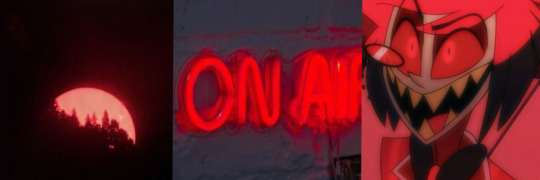
Falling in love
Let’s be honest, Alastor rarely actually likes most beings as a friend, let alone as a romantic partner
But when he does for either scenario, he has to notice that person as more than just some pawn for entertainment
Maybe you’re more socially intelligent, maybe you have more power, maybe you’re closer to Charlie, maybe all of those
But there has to be something that makes him see you as a threat to his power, or his control
Because of this when you first enter the hotel, he’s going to try to upstage you
If he can find a flaw about you, he’ll utilize that to the max
Think how he acted around Lucifer in ‘Dad beat Dad’
But when he notices you’re not going to be intimidated by him he starts to grow angry
If you really wanna ruffle his feathers just ask “uhm…who are you..?”
Not even in a polite way, just in a rude judgmental way
Oh, that makes his blood boil
When he’s not around you, at first he’s trying to get rid of you, take away the threat
But then you leave for a long period of time without notice to anyone but husk
And not even sober husk
So basically nobody really knows where the hell you went (pun intended)
The first maybe hour or two Alastor was like “good riddance”
But then for some damn reason he started to miss you
If you’re gone for more than one day, his mood actually visibly changes
Sure he’s still smiling, but he’s still a bit less motivated to do things
And he’s probably having troubles with coming up with ideas for his radio broadcast
Then you come back and he’s back to normal
It’s like his subconscious went “oh, cool :D”
But now that brings up another obstacle for him
As established before he wants any threats out of his way, but he somehow has grown attached to you?
This wasn’t what he wanted, no not at all
Now what was he supposed to do?
Even worse is the realization that he still has humanity
Humanity is weakness
And if some like say… Vox found out about this?
He’d be royally fucked
It takes a looong while for him to figure out that A. It was love, and B. Come to terms with that
Lots of avoidance and back handed comments
If you sat at the bar? He’d leave
If you tried to compliment him, you’d only get a short “Hm.”
If you invited him to talk with you, even just to get to know him he’d make an excuse
And if Charlie attempts to force him he will refuse/ escape in some way
Blowing up and asking him what his problem is won’t help either
He’ll sit there with a patient smile with petty thoughts, and justifications for his actions running through his head as he tried to appear unfazed
Until someone interrupts/ ends the conversation or you just give up and leave
He’ll leave while rolling his eyes slightly, muttering about how sensitive people are these days
Once he does finally come to terms with it, he’s less hostile around you
Don’t get me wrong he still avoids you like the plague because you’re his only weakness
But he’s kinder to you when he does interact with you
Maybe he’ll offer to pay for your drink before leaving
He might even leave a little box of homemade chocolates at your door, or give you some ‘leftover’ Jambalaya he made specifically for you to try
Little favors like that
Dating
It’s never really said aloud that the two of you are dating
It just was sort of agreed upon silently between the two of you
One day he invited you via letter to come skygaze with him at his radio tower
At first you’re kind of suspicious that he has an ulterior motive
But when you get there and you’re invited to sit beside Alastor, you realize he just wanted to see you. Why? You didn’t know, but at least his intentions weren’t ill
Then he crossed his pinky with yours
Nothing grand like kissing, he’s not too fond of physical affection
But just a small bit of contact
If you choose to interlock your pinky with his, internally he’ll lose his mind
It’s like confirmation that you feel the same way without verbally saying it
Since then everyone just sort of knew at the very least he cared a bit more about you
He’d frequently talk with you
Like how most people would interact with good friends
Except he gets a little more protective of you
There’ll be a shadow that follows you everywhere
Sometimes the shadow will tease a bit
Maybe pick up a piece of hair and then put back in place quick, or maybe brush against your arm, nothing harmful, really
Since he doesn’t really show his love through physical affection, he shows it through gifts or acts of service
Mainly acts of service
You’ll often go back to your room after a hard day to find your bed made and your pillows fluffed with a new stuffed animal on your bed
His favorite way to show his affection physically is by your hand
He won’t really hold your hand outright, but he’ll usually gently kiss it after saying something romantic
Maybe if your sitting at the bar, talking with Husk he will
When he’s feeling especially happy, or romantic, or he somehow got wasted, he’ll give you a peck on the lips, but that’s about the only time you two really kiss
He will cuddle if you ask to but otherwise he doesn’t really do cuddling
The first time you tell him you love him, even just as a quick goodbye, he’ll melt on the inside
If you look close enough you can see his eyes soften a tad bit
He’ll probably say “you too” if the both of you are in public, or something along those lines, but if you’re in private, maybe cuddling or as he’s comforting you for some reason
He’ll say it softly, and then most likely give you a small head pat, or if he’s getting really sentimental, he’ll give you a peck on the forehead
All in all, he does love you, he just sort of shows it in his own way that he’s comfortable with <3

#alastor x reader#alastor hc#alastor#alastor hazbin hotel#hazbin hotel#alastor the radio demon#radio demon#falling in love#dating#headcanon#dating headcanons#x reader headcanons#my hcs#alastor hcs#hazbin alastor#hcs#head canon#radio#hazbin hotel x reader#the radio demon#fanfic#in love#idk how to tag this#idk man#hazbin hotel season 1#alastor x gn!reader#hazbin hotel season one#dad beat dad#hazbin hotel imagine#hazbin hotel hc
186 notes
·
View notes
Text
My specific read on John is not that he's a nice guy, either. It's that, like any good character (specifically a tragic character, which, TM has said that he is modeled on a mythical tragic hero, so) he has a flaw that dooms him. And what that means is, when he has the choice to change what he's doing, that flaw either prevents him from taking the option he's aware of, or prevents him from being aware that there is another option altogether.
And so as a writer, what I look for are moments where either:
something good about a character becomes an excess that harms themselves or others
we receive information that shows a persistent blind spot a character has
we look for times when a character gives their view of the world/a situation and it Does Not Match Up with reality, or is hinted that it doesn't
we look for evidence of something simmering under the surface that clashes with their outward, agreeable presentation
What fills that role for John?
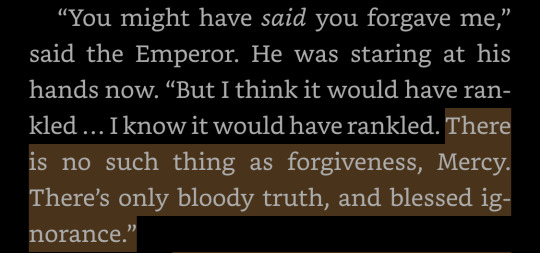
Yep.
When this first pops up, it's pretty easily dismissed as yet another layer on the falsehood he's propped up. Admittedly, he's been doing it for ten thousand years, so it's probably got a few layers to it.
However:

This one, to me, gives us a hint about what John is blind to: That his friends see his vindictiveness and his failings and that they could still love him. This is where it crosses into tragedy, for me; where his own inability to forgive blinds him to the capacity that other people have for generosity--and so, to a world where "justice" means more than "vengeance for the dead".
And this illuminates the whole chain of events that leads him to that climactic scene in Harrow the Ninth, telling Mercy that she never would have forgiven him anyways:
John is, at heart, deeply angry--like most characters in the series, and like a lot of people who grew up in poverty, especially if they managed to escape it. He also has some deep sense of justice, and deep sense of judgment.
So we have this cycle of related emotions and ideas: Justice, judgment, outrage. And a human measure of selfishness, amorality, double standards, etc.
In one situation, this allows him to throw himself completely into the cryo project, something that (if it hadn't been sabotaged politically) could have made a difference to humanity. He brings in people who work to make it even better, who demonstrably want to make the outcome as just and humane as possible. It's also implied that this is part of why he received those powers; "I chose you to change."
(And, I'll be honest, one of the other things that I see that chafes me is the implication that there was nothing about John to recommend him to the Earth. I'm actually of the opinion that there was; she chose him, and I don't think she just rolled a d100 or drew a card off a tarot deck and called him up. John is also still a human, flawed person.)
Then, the situation changes. It's no longer an issue of dedicating expertise to solve a problem; this is a political issue, and specifically of rich people using their resources to shift outcomes towards the one they think will benefit them the most, that will secure their survival, explicitly at the expense of everyone else.
And their strategy is, profoundly: short-sighted and unnecessary (pooling resources would help create a better outcome for everyone, including the rich, by reducing global trauma and preserving more of the systems that already structure their world); bigoted and uninformed (many rich people think that the world has to be a certain way, generally that the world is violent, competitive, dog-eat-dog, etc., and someone has to be "on top", and there will always have to be a loser, or lots of losers); and utterly cruel, unjust, and pointless.
And John--John, who grew up poor, who grew up aware of the despair around him and the injustice of his position and more than likely made use of that anger to achieve what he had up to this point--John is so angry.
Because they're all the same. They're all the same. It's the same song, over and over again, no matter how stupid and pointless and unnecessary. He is certain, beyond a shadow of a doubt, that it doesn't have to be this way. He passes judgment.
But John is losing to them, because he doesn't have the resources they do. He can hate them and fight them all he wants, and it doesn't matter, because he's nowhere near in the same league as they are politically.
And then, after the cryo project is cancelled, he gains his powers.
The thing about anger and judgment is that the deeper it runs, often, the more invested the person who holds that anger in themselves is in not seeing what they hate in themselves. E.g: John has conceptualized the people he's resisting as fundamentally unjust, cruel, amoral, and bigoted. There's a very good chance--to different degrees, depending on the person--that becoming aware of similar traits in himself might wake up those feelings he has towards those other people--aimed at himself (that is, cognitive dissonance). He can't see the things he's passed judgment on in himself and function. He's not like them; he's trying to fix things, to bring about justice.
Of course, there's justice as in "living in a just society", and justice as in "justice for the dead". But that's a later realization, because right now, everyone is still alive.
So John hides those parts of himself; from himself, from other people. So thoroughly he can exclude it from his consciousness and pretend it doesn't exist. He thinks no one sees the real depth of his own rage, his own cutthroat pursuit of a solution. And then, when he can't pretend it doesn't exist, he can still pretend to be the man he thinks they need him to be. He can "fool" them. He can say--he's trying. He screwed up. He doesn't know what he's doing.
And then, Casseiopeia says, No, actually, we know you, and we know you're horribly vindictive. And we're on your side--we're on the same side--our fight is your fight--and we love you. But your drive for revenge is seriously limiting your ability to imagine and create a living, just world, and that's what we're fighting for. Remember? That's what we set out to create.
And John's brain can't quite handle this; he can't imagine that they could actually see him and still be on his side. Because he couldn't see that and still be on his side. He can't forgive; he can't imagine forgiveness.
He can't see the things he's passed judgment on in himself and function.
And, by this stage, in some ways, it's already too late to change course. But this is one of several "come to Jesus" (no pun intended) moments where John could become aware of alternatives, or could change his behavior--and doesn't.
And I think this is where we get that self-awareness from, the thing that makes him creepy and tragic but also infuriating: He is aware, but apparently that's not enough to stop him from being his worst self--so is he just pretending to be moral? Capable of making different choices but choosing not to? And the weird statements he makes later:
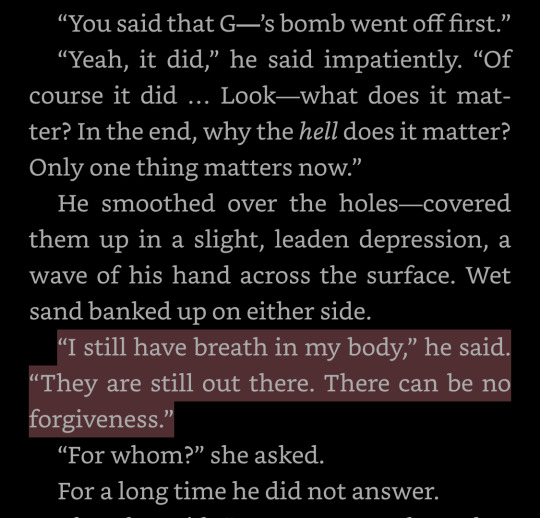
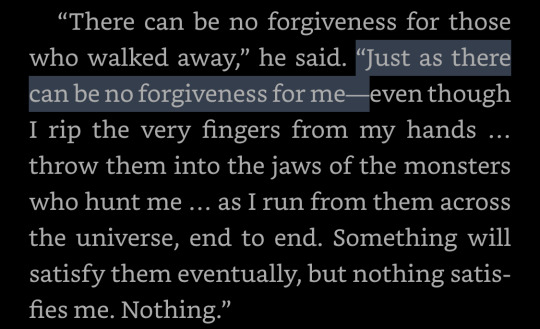
This is, imo, not a power-hungry dictator who genuinely doesn't care about the cost of his throne, or a gleefully predatory abuser. This is a dude who's committed to a course of action and doesn't feel great about it. This is a guy who has violated his own sense of justice and has to live with it.
This is a guy who set out to save the world, killed it, and now the only thing that's left to him is to avenge it.
And like, from a mythology standpoint, that is exactly what the Erinyes are, like the Furies and Alecto. They are not the justice of Apollo or Athena. They are screaming for blood. They are hunting their quarry to the ends of the universe. They are chthonic.
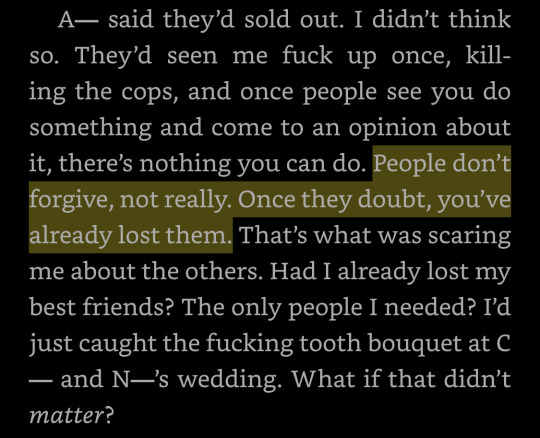
Again: This isn't what Cassieopeia or Christabel said to him. This is what John has said to himself. This came from him. This is a reflection of what he believes.
And it encapsulates, exactly, why he erased their memories. Why he took away their agency.
The difference between him and many, many people is he had the power of a god and no one to check him when he was struggling with his own worst impulses. And then, he created a world where no one could, not just because then he could do what he wanted and pretend to be kind and loving and moral, but so that he would never have to lose the love of the people he needed.
Because, unfortunately, he still needed them.
It just took ten thousand years for the lie to unravel.
#the locked tomb#john gaius#tlt meta#i'm not a john gaius apologist. i just think about cognitive dissonance a lot#and frankly tumblr and twitter are the home of cognitive dissonance
206 notes
·
View notes
Text
On what I'm going to call "peer positioning" in witchcraft, and the scary empowerment it can bring you
I think a lot of people who get into witchcraft have a problem with being able to see themselves as peers & equals to the powers they cultivate around them.
I see this most often discussed when it comes to gods. "Just because your god asks you for something doesn't mean you need to do it!" Etc. I think we've all heard that.
But today my thoughts are on the tarot, and how some people seem to treat tarot readings as "the truth" or "the answer" that then must be followed, even if they (the living, breathing, human practitioner) don't really agree or don't really want to do that.
I'm really big on the analogy of a witch as a monarch, and the concept of various powers (like gods, spirits, tools, and spells) being counselors in the throne room.
In this context, it's easier to adopt the mindset that all of these powers have their own personalities, abilities, and goals - and that they can & will provide conflicting information when you ask for advice. (Especially ancestors - so opinionated!)
Imagine Captain Picard sitting in the meeting room with Geordi, Riker, and the rest of the space nerds.
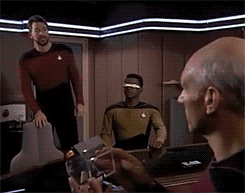
Captain Picard is like, "the power core is failing and the away team is stranded on the planet. I think we should use the nebula to hide until the Gromflomites stop searching for us."
And then Geordi is like, "but Captain, the engines would never make it! We have to go rescue the away team immediately!"
And Captain Picard is like, "damn... Wow. I really wanted to go to the nebula, I thought it was the best choice :/ but if you're saying we literally don't have to worry about the Gromflomites..."
Then Riker is like, "Captain, no. Geordi isn't saying the Gromflomites aren't a problem, he's just expressing his top concerns as Chief Engineer."
And then Picard is all, "oh, so... this is conflicting information? Did that mean I did a bad reading on Geordi, or that negative spirits are stopping me from being able to communicate? Is Riker possibly a trickster?"
If you're captain of the ship, monarch of the kingdom, (etc.), then it might be important to ask yourself:
Am asking for input from my counsel of allied powers, and then making choices for myself?
Or, have I inadvertently signed over my decision-making process to these powers?
And I think it all kind of comes back to "peer positioning," or, witches being able to develop a spiritual framework within which they are equals to the powers around them.
Since beginning practicing witchcraft in earnest, I have often demanded a course of direction. Instead of asking, "how do I accomplish this?" I would ask, "what do I do?"
And the answer was the same every time, deeply infuriating, but also very scary: "Do whatever you think is best."
I think that's the problem of being the captain of the ship. Once your counselors are done giving their input, you are the one who has to make the final call.
Lately I've really been on a kick about witchcraft as a path of empowerment, and I think that viewing spiritual input as just that - input - is a vital part of the process.
Even if you are a true-blue believer in the magical power of tarot, tarot is still just one counselor sitting in your throne room.
Even if you have tutelary spirits, guardians and guides, gods and angels, providing blessings and support - they are not sitting at the head of the table.
You are.
I think that a framework of allied powers as peers and equals is relatively basic, and does have its flaws. But I also think it can be helpful in a variety of ways:
It can provide a system of understanding why allied powers can give conflicting advice, or even seemingly bad advice that doesn't align with our personal desires.
It can provide a tool for processing spiritual input.
It helps restore a sense of personal authority to a practitioner.
It can help a practitioner reclaim control of a path that's grown a mind of its own.
It aids in practicing that most oppressive of skills - liberated autonomy.
I just think it's something to consider. At the end of the day, most of us have probably got to make our own calls.
[I'm making this post because in the past few months I've been helping witches consult the tarot, and they've been giving feedback like, "so this is what I should do, right?" or, "what is it telling me to do?"
I can basically see the huge reblogs where people are explaining that a period of time where they signed complete personal autonomy over to their god was the most empowering and spiritually electric time in their lives,
and I want you to know, I'm not speaking about vows and oaths made to entities that gives them control over your life. I'm talking about situations where witches put down their autonomy so they can have both hands free to shuffle tarot.]
368 notes
·
View notes